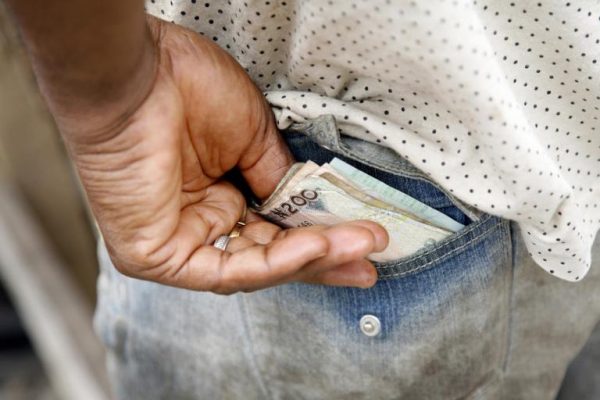You observe a mind-boggling rise in the price of a sack of garri; upon inquiry, you are told by the solemn-faced madam at the other end of the table that “dollar don increase” – the common man’s way of saying that the naira value of a dollar has risen. Or, to put it differently, the dollar value of the naira has fallen. Actually, it hasn’t fallen. It has plunged.
But what has the naira-dollar exchange rate got to do with a bowl garri?
Perhaps there has been an exploitative move by market vendors to jack up prices of their wares. A lot of the price hikes we have seen so far have been artificial. Nevertheless, there has been a real surge in costs incurred by businesses which have to use imported inputs in their production of goods; and in any case, Nigeria depends heavily on imported products and materials, whether they be raw, finished, or anywhere in-between.
The problem Nigeria faces with its foreign exchange is closely connected to the collapse of oil prices on the international commodities market. Nigeria’s economy has oil as its lifeblood, its heart, and its fundamental pillar. And because a huge (I’d say startling) amount of its foreign exchange is gained from its sale of crude oil, its currency’s exchange rate is heavily influenced by the oil price swings. If there is a substantial rise in oil price, forex earnings are bolstered, and the value of the naira with respect to the dollar and other major currencies rises; if there is a sustained fall in oil price, forex earnings dwindle. If this continues to be the case, and there is (as always) a great demand for foreign currencies, reserves will eventually be depleted. The result is a fall in the value of the local currency (the naira), as more of it chases other increasingly scarce foreign currencies (the dollar, pound, euro etc.). And it is this second, unpleasant situation that the Nigerian economy has found itself in.
Businesses have found that they have to increase the price of their goods as they try to factor in the added production cost brought about by imported inputs; other, imported finished products, also bear price tags that make the local eyes water. In addition, there is the multiplier effect: as an interconnected economy, price rises as commodities tend to have a ripple effect that touches a variety of seemingly unrelated sectors.
This is a crisis. We have seen factories close down; students studying abroad having to abruptly suspend or terminate their programs; banks being unable to meet forex obligations to their customers; and yes, the tortuous expense of patronizing sellers of high-priced goods (whether the prices are fair or merely exploitative).
The government sees this as a grave problem- and rightly so. The naira has taken an absolute battering on the markets; as the oil price crashed, the CBN had intervened in November 2014 by devaluing the currency against the dollar by 8%, from ₦155 to ₦168. As at the 24th of March 2016, the official exchange rate stood at ₦199 to $1. And that’s the official exchange rate.
The widening of the gap between the official and parallel market rates of exchange hints at the fact that government has tried in recent times to control rates (at the black market, a dollar is currently exchanged for as high as ₦320). It has restricted withdrawals of forex in the effort to save the relatively little that exists in the vaults of the CBN. While it tries to save the naira, it has inflicted harsh wounds on the economy, as businesses now struggle to get by with limited purchasing power.
Another option for the government is to let the currency float, or find its level on the international markets. This entails the lightening of restrictions on the buying and selling of foreign currencies. The problem with this, however, is that it may lead to even more severe price hikes, possibly to proportions which may fuel political unrest or a possible uprising against the government- a condition which the Nigerian government is keen to avoid.


